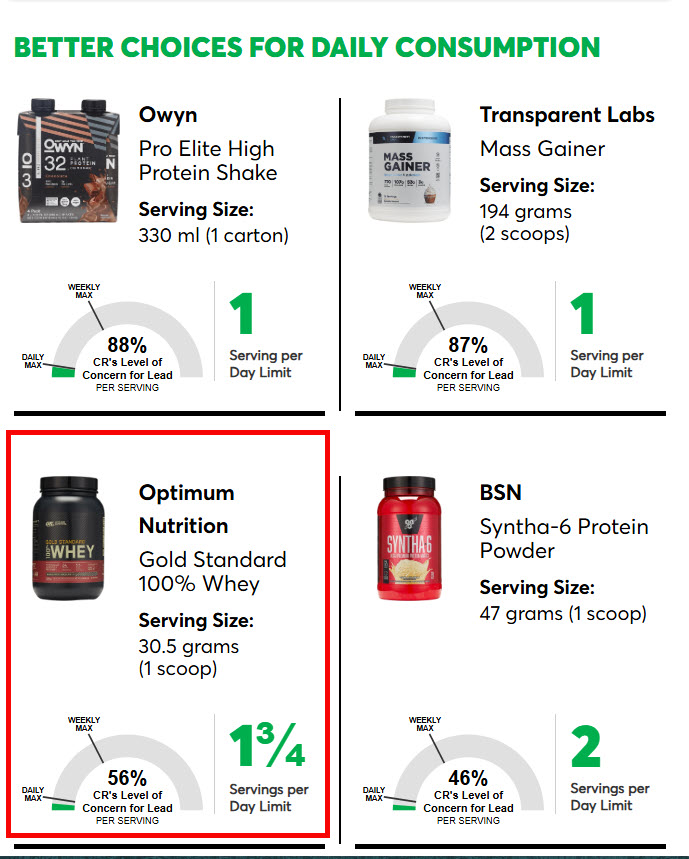rickyf
#2
Thankfully I’ve been using Optimum Nutrition Chocolate Whey, which CR says is okay for daily use.
[CR - Optimum Nutrition Whey is OK.pdf|attachment]

1 Like
KarlT
#3
Am I’m reading correctly that the problem is mostly with plant based protein?
1 Like
You are reading correctly that the problem appears 5-8 times worse with the worst plant-based protein powders.
They seem to come with flavoring.  Thanks for the post, but if that’s all that is good, I guess I’m still off the powers.
Thanks for the post, but if that’s all that is good, I guess I’m still off the powers.
Any suggestions for a complete plant-based protein powder with confirmed low levels of lead?
Beth
#7
Yes, I also read in a Wash post article the problem was only plant proteins (which are all that I consume). Any clue on why or which ingredients to look out for ?
I use kachava for the yummy taste, or NorCal organic pea
@austin242 I assume that Blueprint protein has measured their lead (but I have not checked). If I recall, I dismissed it early based on the sat fat.
I just looked and it is tested
And i see they have a new version (the old nutty pudding) that is much lower in sat fat… https://blueprint.bryanjohnson.com/products/longevity-protein-chocolate?variant=50015669780765
1 Like
Beth
#8
I’ll ask this here incase anyone of you plant protein consumers know.
I would prefer to have two cups of soy milk (mixed with cocoa/cacao powder or not) than to have a protein shake. My soy milk is 12 grams per cup, so it would be fairly equal in protein.
I already have two cups in the morning in my lattes.
Question:
-
Is there any reason not to have 4 cups of soy milk a day (I feel there might be)
-
is there any advantage to a protein powder over soy milk? I imagine it doesn’t matter
I assume you mean whey protein powder vs soy. Whey protein will be absorbed faster and have more bioavailability, in general. It will also have more amino acids (same as meat vs vegetable proteins ), and have more leucine content.
3 Likes
Whey is my go to. I sometimes supplement with pea/rice protein but whey tastes better and feels better to consume.
Agreed on the taste. Most Vegetable protein powders seem to have less than ideal taste and texture in general.
I’m wondering if there is something about the processing or if it’s just a matter of concentration. In other words, is there lead in pea plants? Is there lead in milk? Wouldn’t there have to be for it to get concentrated by these powder producers?
You can probably point to the soil for that. Plants absorb it, and further processing probably concentrates it. Protein from whey probably doesn’t have that issue because animals filter out contaminants when processing food.
Yes, it makes sense that it is in the soil. My point is – if it’s in the soil, isn’t it in all of our food?
1 Like
Possibly, yes. This is assuming plants used for making these proteins are also used to feed people, which is probably not the case sometimes . The other factor is concentration. Getting 25 grams of pea protein is not the same as getting the equivalent in peas
Good points.
Hypothesis one is that the peas for pea protein production are grown on sketchy land contaminated more than other land.
Hypothesis two is that, if you are plant-based and aiming for Attia levels of protein, you are going to assault your body with lead and extreme quantities of fiber.
It seems like the optimal solution to all the problems is using giant vats of genetically engineered yeast to make bioidentical whey protein for use in protein powder. You get the amino acid profile you want with no animal impact and no soil contaminants.
3 Likes
A large steak from time to time is also a solution I’m satisfied with 
A large steak is great except it’s not as nice for the cow.
1 Like